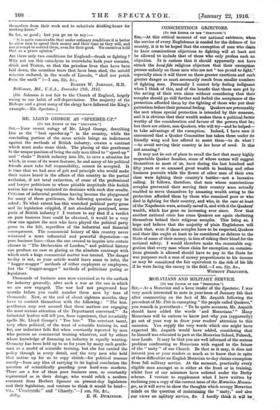CONSCIENTIOUS OBJECTORS.
(To THE EDITOR OP THE " SPECTiT01.1
Sra,—At this critical moment of our national existence, when the service of every Englishman is needed for the defence of his country, it is to be hoped that the exemption of men who claim to have conscientious objections to •fighting will at least not be allowed to include that of those who only profess such an objection. It is curious that it should apparently not have struck the bond-fide religious objectors that their exemption presses unfairly on those men who are not " too proud to fight," especially since it will throw on these greater exertions and such greater danger as must necessarily result from smaller numbers of fighting men. Personally I cannot help feeling indignant when I think of this, and of the benefit that those men get by the saving of their own skins without considering that their scruples should go still further and forbid the acceptance of the protection afforded them by the fighting of those who put their patriotism before their personal feeling. Quakers are presumably the sect whose special protection is intended by this measure, and it is obvious that their wealth makes them a political factor worthy of the consideration and favour of the powers that be; but there are others, non-Quakers, who will try—and be helped— to take advantage of the exemption. Indeed, I have seen it announced that a Quaker Committee has taken these under its friendly wing and has offered to assist them—to do what ? —to avoid serving their country in her hour of need. Is this not amazing 9 It may not be out of place to recall the fact that many highly respectable Quaker families, some of whose names will suggest themselves to most of us, have during the last hundred and fifty years or so amassed great wealth in banking and other business pursuits while the flower of other men of their own elms were fighting their country's battles—not a lucrative calling. It follows, therefore, that men whose conscientious scruples prevented their serving their country were actually enabled to serve themselves by amassing wealth owing to the protection afforded them by those who remained poor or who died in fighting for their country, and who, in the case at least of the Napoleonic wars, actually saved it, and with it the Quakers' wealth, which has gone on increasing ever since. Now that another national crisis has come Quakers are again sheltering themselves behind their religious scruples. This being so, I hope and believe that the majority of plain Englishmen will think that, even if these scruples have to be respected, Quakers and their like ought at least to be considered as debtors to the State of some of their money, in lieu of risking their blood for the national safety. I would therefore make the reasonable sug- gestion that every man whose claim for exemption on conscien- tious grounds is allowed should have to pay to the State for war purposes such a sum of money proportionate to his income as may be considered the fair equivalent to the risk of his life if he were facing the enemy in the field.—I am, Sir. &c., Wrruoux PREJUDICE,


































 Previous page
Previous page